Ward A.W. The Cambridge History of British Foreign Policy. 1783-1919. Volume 3
Подождите немного. Документ загружается.

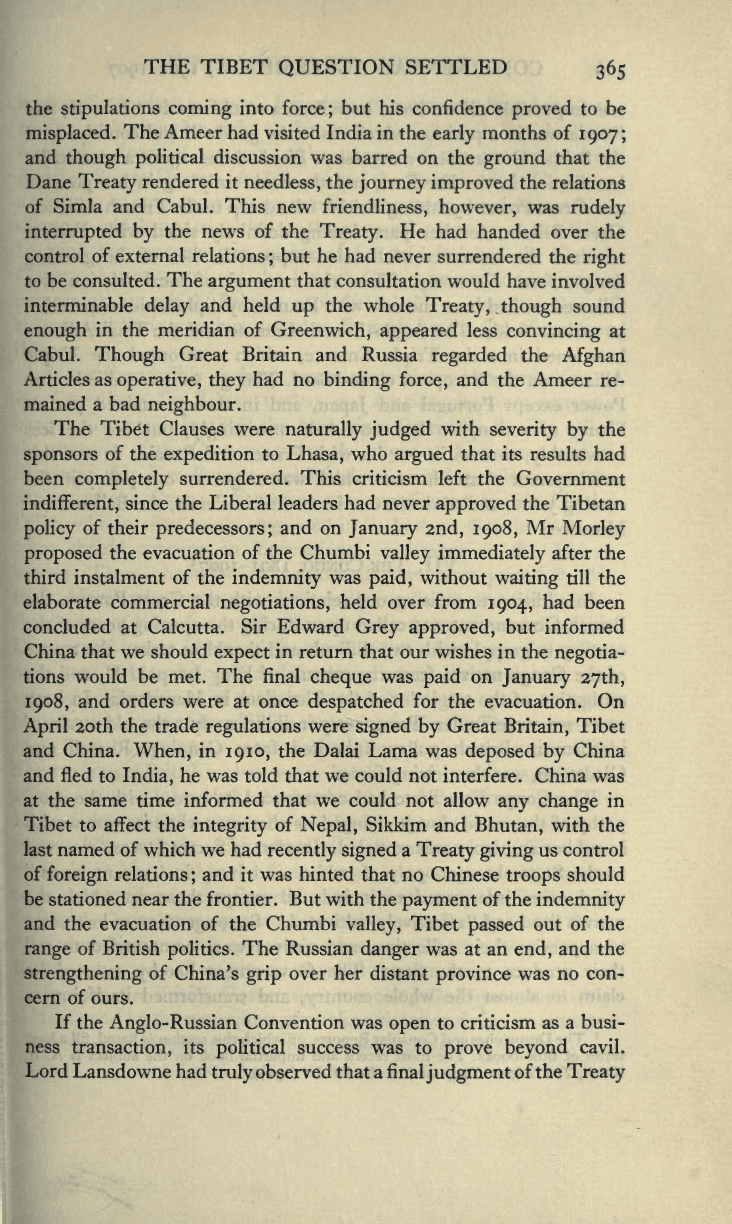
THE
TIBET
QUESTION
SETTLED
365
the
stipulations
coming
into
force;
but his
confidence
proved
to be
misplaced.
The
Ameer had
visited
India in
the
early
months
of
1907;
and
though
political
discussion
was barred on
the
ground
that
the
Dane
Treaty
rendered
it
needless,
the
journey
improved
the
relations
of Simla and Cabul. This
new
friendliness,
however,
was
rudely
interrupted by
the
news of
the
Treaty.
He
had
handed
over
the
control
of
external relations
;
but he
had
never
surrendered
the
right
to
be consulted. The
argument
that consultation would
have
involved
interminable
delay
and
held
up
the
whole
Treaty,
though
sound
enough
in
the
meridian
of
Greenwich,
appeared
less
convincing
at
Cabul.
Though
Great Britain and
Russia
regarded
the
Afghan
Articles
as
operative,
they
had no
binding
force,
and
the
Ameer
re-
mained a
bad
neighbour.
The
Tibet Clauses
were
naturally judged
with
severity by
the
sponsors
of
the
expedition
to
Lhasa,
who
argued
that
its results
had
been
completely
surrendered. This
criticism
left the
Government
indifferent,
since
the
Liberal
leaders had never
approved
the Tibetan
policy
of
their
predecessors;
and
on
January
2nd,
1908,
Mr
Morley
proposed
the evacuation
of
the
Chumbi
valley immediately
after the
third
instalment
of
the
indemnity
was
paid,
without
waiting
till the
elaborate
commercial
negotiations,
held over
from
1904,
had
been
concluded
at Calcutta.
Sir Edward
Grey approved,
but
informed
China
that
we should
expect
in
return that our wishes
in
the
negotia-
tions
would be
met.
The final
cheque
was
paid
on
January
27th,
1908,
and orders
were at once
despatched
for
the evacuation.
On
April
20th
the trade
regulations
were
signed
by
Great
Britain,
Tibet
and China.
When,
in
19
10,
the
Dalai
Lama was
deposed
by
China
and
fled
to
India,
he
was
told
that
we could
not interfere.
China was
at the
same
time
informed
that we
could
not allow
any
change
in
Tibet to
affect the
integrity
of
Nepal,
Sikkim and
Bhutan,
with the
last named of which we had
recently signed
a
Treaty giving
us
control
of
foreign
relations
;
and
it
was hinted
that
no
Chinese
troops
should
be
stationed
near
the frontier. But
with
the
payment
of
the
indemnity
and
the
evacuation of the
Chumbi
valley,
Tibet
passed
out
of the
range
of
British
politics.
The Russian
danger
was at
an
end,
and
the
strengthening
of
China's
grip
over
her
distant
province
was
no con-
cern
of ours.
If
the
Anglo-Russian
Convention
was
open
to criticism
as a busi-
ness
transaction,
its
political
success was
to
prove
beyond
cavil.
Lord
Lansdowne had
truly
observed that a final
judgment
of the
Treaty
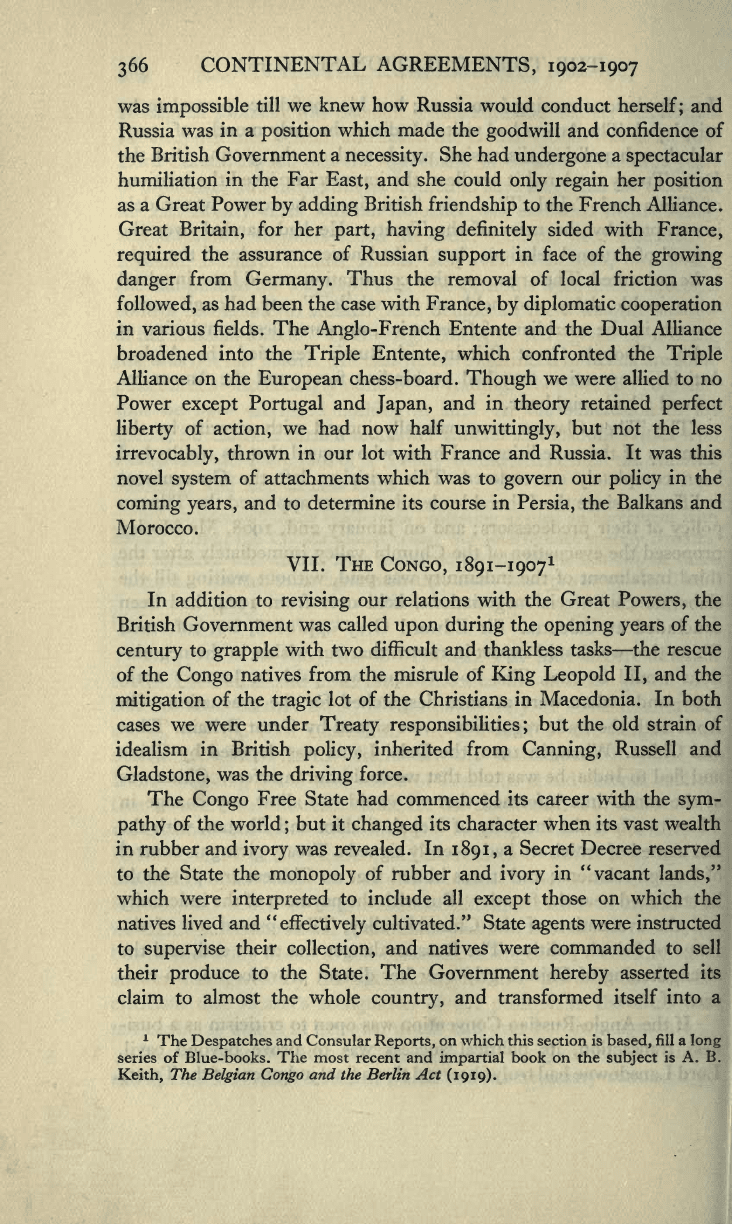
366
CONTINENTAL
AGREEMENTS,
1902-1907
was
impossible
till we knew how Russia would
conduct
herself;
and
Russia
was
in
a
position
which
made the
goodwill
and confidence of
the
British
Government
a
necessity.
She had
undergone
a
spectacular
humiliation
in
the
Far
East,
and she could
only regain
her
position
as
a Great Power
by adding
British
friendship
to
the
French
Alliance.
Great
Britain,
for her
part,
having definitely
sided with
France,
required
the
assurance of Russian
support
in face of the
growing
danger
from
Germany.
Thus the removal of local
friction was
followed,
as
had
been the case with
France,
by
diplomatic cooperation
in
various
fields. The
Anglo-French
Entente
and
the Dual Alliance
broadened
into
the
Triple
Entente,
which
confronted the
Triple
Alliance on
the
European
chess-board.
Though
we were allied to no
Power
except Portugal
and
Japan,
and
in
theory
retained
perfect
liberty
of
action,
we
had
now
half
unwittingly,
but not
the less
irrevocably,
thrown
in our
lot with
France and Russia. It
was
this
novel
system
of
attachments
which
was
to
govern
our
policy
in
the
coming
years,
and to determine its
course
in
Persia,
the
Balkans and
Morocco.
VII.
The
Congo,
1891-1907
1
In
addition to
revising
our
relations with the Great
Powers,
the
British
Government
was called
upon
during
the
opening
years
of
the
century
to
grapple
with two difficult
and
thankless
tasks
—
the
rescue
of the
Congo
natives
from
the
misrule of
King
Leopold
II,
and
the
mitigation
of the
tragic
lot
of the Christians
in Macedonia.
In
both
cases
we were under
Treaty
responsibilities;
but the
old
strain
of
idealism
in
British
policy,
inherited from
Canning,
Russell
and
Gladstone,
was
the
driving
force.
The
Congo
Free
State
had
commenced
its career with the
sym-
pathy
of the world
;
but
it
changed
its
character
when
its vast wealth
in rubber
and
ivory
was
revealed.
In
189
1,
a
Secret
Decree reserved
to
the State
the
monopoly
of rubber and
ivory
in
"vacant
lands,'*
which were
interpreted
to
include all
except
those
on which
the
natives
lived and
"effectively
cultivated."
State
agents
were instructed
to
supervise
their
collection,
and
natives
were commanded to
sell
their
produce
to
the
State.
The Government
hereby
asserted
its
claim
to
almost the
whole
country,
and
transformed itself
into
a
1
The
Despatches
and
Consular
Reports,
on which this section is
based,
fill
a
long
series
of
Blue-books.
The most recent and
impartial
book on the
subject
is A.
B.
Keith,
The
Belgian
Congo
and
the Berlin Act
(1919).
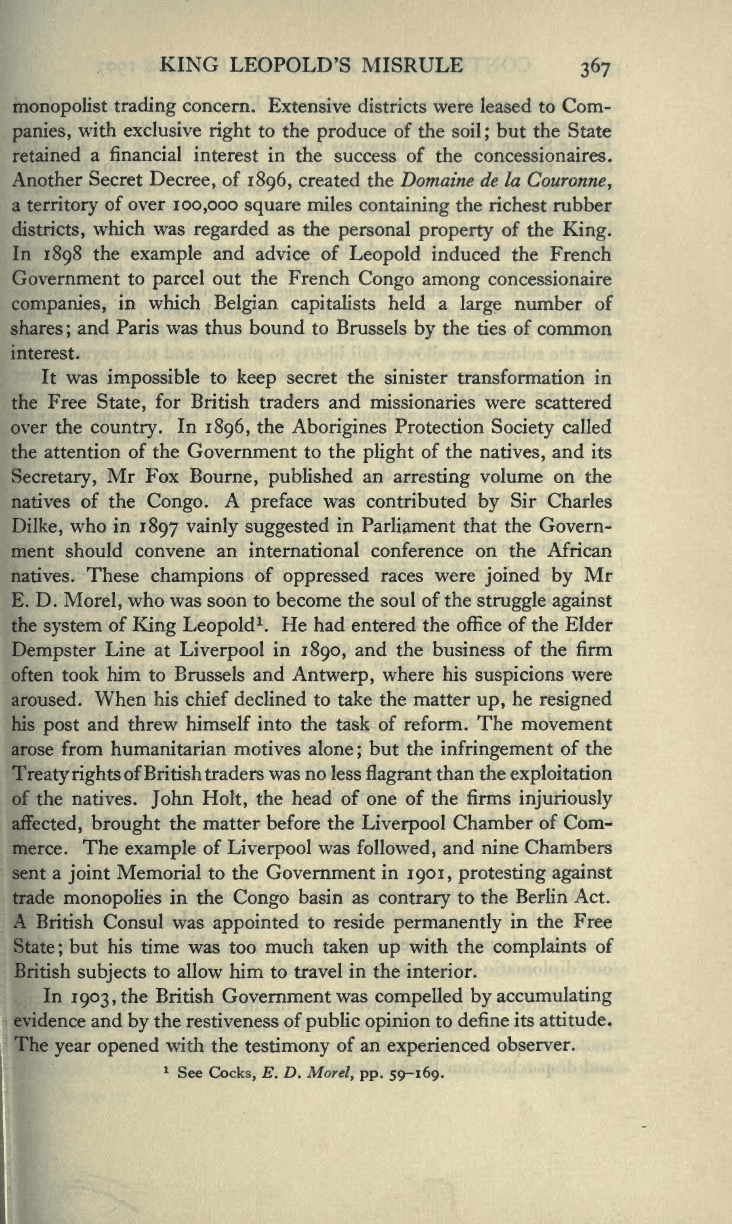
KING
LEOPOLD'S
MISRULE
367
monopolist
trading
concern.
Extensive
districts
were leased to Com-
panies,
with
exclusive
right
to
the
produce
of
the
soil;
but
the
State
retained
a
financial
interest
in
the success
of
the
concessionaires.
Another
Secret
Decree,
of
1896,
created the
Domaine de la
Couronne,
a
territory
of over
100,000
square
miles
containing
the richest
rubber
districts,
which
was
regarded
as
the
personal
property
of
the
King.
In
1898
the
example
and advice of
Leopold
induced
the
French
Government to
parcel
out the French
Congo among
concessionaire
companies,
in which
Belgian capitalists
held a
large
number of
shares
;
and Paris was
thus
bound
to Brussels
by
the ties
of
common
interest.
It
was
impossible
to
keep
secret
the sinister
transformation
in
the
Free
State,
for
British traders
and
missionaries were
scattered
over
the
country.
In
1896,
the
Aborigines
Protection
Society
called
the
attention
of the Government to the
plight
of the
natives,
and
its
Secretary,
Mr Fox
Bourne,
published
an
arresting
volume on
the
natives of the
Congo.
A
preface
was
contributed
by
Sir
Charles
Dilke,
who
in
1897 vainly
suggested
in
Parliament
that
the Govern-
ment
should convene an international conference on the African
natives.
These
champions
of
oppressed
races were
joined by
Mr
E.
D.
Morel,
who
was soon to
become
the
soul of the
struggle
against
the
system
of
King
Leopold
1
. He had
entered
the office
of
the
Elder
Dempster
Line at
Liverpool
in
1890,
and
the
business
of
the
firm
often took
him
to
Brussels and
Antwerp,
where his
suspicions
were
aroused. When his chief
declined
to take
the
matter
up,
he
resigned
his
post
and
threw
himself
into the task
of
reform.
The movement
arose from humanitarian motives
alone
;
but the
infringement
of
the
Treaty rights
of
British
traders
was no
less
flagrant
than the
exploitation
of
the natives.
John
Holt,
the
head of
one of the
firms
injuriously
affected,
brought
the
matter before the
Liverpool
Chamber
of Com-
merce. The
example
of
Liverpool
was
followed,
and nine
Chambers
sent
a
joint
Memorial
to the
Government
in
1901,
protesting
against
trade
monopolies
in
the
Congo
basin as
contrary
to
the
Berlin Act.
A
British
Consul was
appointed
to
reside
permanently
in
the
Free
State
;
but
his
time
was
too
much taken
up
with the
complaints
of
British
subjects
to
allow
him to
travel
in
the interior.
In
1903,
the British
Government
was
compelled by
accumulating
evidence
and
by
the restiveness of
public
opinion
to
define its
attitude.
The
year
opened
with
the
testimony
of an
experienced
observer.
1
See
Cocks,
E. D.
Morel,
pp. 50-169.
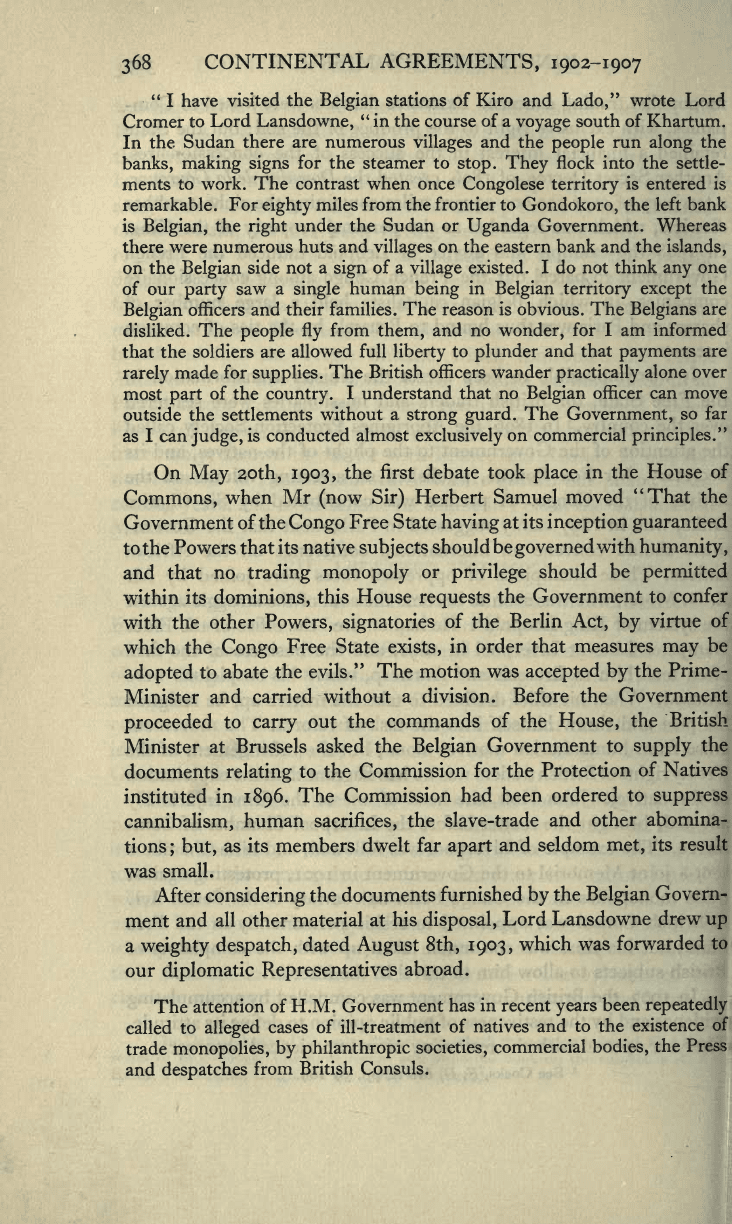
368
CONTINENTAL
AGREEMENTS,
1902-1907
"I have
visited
the
Belgian
stations
of
Kiro
and
Lado,"
wrote
Lord
Cromer
to
Lord
Lansdowne,
"
in
the course
of
a
voyage
south
of
Khartum.
In
the
Sudan
there are numerous
villages
and
the
people
run
along
the
banks,
making
signs
for the
steamer
to
stop. They
flock
into
the
settle-
ments
to work.
The contrast
when
once
Congolese territory
is
entered is
remarkable.
For
eighty
miles
from
the
frontier to
Gondokoro,
the
left bank
is
Belgian,
the
right
under
the
Sudan or
Uganda
Government. Whereas
there
were
numerous huts
and
villages
on the
eastern
bank and
the
islands,
on the
Belgian
side
not a
sign
of a
village
existed. I do not
think
any
one
of
our
party
saw
a
single
human
being
in
Belgian
territory
except
the
Belgian
officers
and their families. The reason
is
obvious.
The
Belgians
are
disliked. The
people fly
from
them,
and no
wonder,
for I am informed
that the soldiers
are allowed
full
liberty
to
plunder
and
that
payments
are
rarely
made for
supplies.
The
British officers wander
practically
alone over
most
part
of the
country.
I understand that
no
Belgian
officer can
move
outside the settlements
without a
strong guard.
The
Government,
so
far
as
I
can
judge,
is conducted
almost
exclusively
on commercial
principles."
On
May
20th,
1903,
the first
debate took
place
in
the
House
of
Commons,
when
Mr
(now
Sir)
Herbert Samuel
moved "That
the
Government
of
the
Congo
Free State
having
at its
inception
guaranteed
to the
Powers
that
its
native
subjects
should be
governed
with
humanity,
and that
no
trading
monopoly
or
privilege
should be
permitted
within
its
dominions,
this
House
requests
the
Government
to
confer
with the
other
Powers,
signatories
of
the
Berlin
Act,
by
virtue
of
which the
Congo
Free State
exists,
in order that
measures
may
be
adopted
to
abate the
evils."
The motion
was
accepted by
the
Prime-
Minister
and
carried
without
a division. Before
the
Government
proceeded
to
carry
out
the
commands
of the
House,
the
British
Minister
at
Brussels
asked the
Belgian
Government to
supply
the
documents
relating
to the
Commission
for
the
Protection
of Natives
instituted
in
1896.
The Commission
had
been
ordered to
suppress
cannibalism,
human
sacrifices,
the
slave-trade
and other
abomina-
tions
;
but,
as its members dwelt
far
apart
and seldom
met,
its
result
was small.
After
considering
the
documents
furnished
by
the
Belgian
Govern-
ment
and
all
other
material at
his
disposal,
Lord
Lansdowne
drew
up
a
weighty
despatch,
dated
August
8th,
1903,
which was
forwarded
to
our
diplomatic
Representatives
abroad.
The
attention
of
H.M. Government
has in recent
years
been
repeatedly
called
to
alleged
cases of ill-treatment
of natives and
to
the
existence
of
trade
monopolies,
by
philanthropic
societies,
commercial
bodies,
the
Press
and
despatches
from British Consuls.
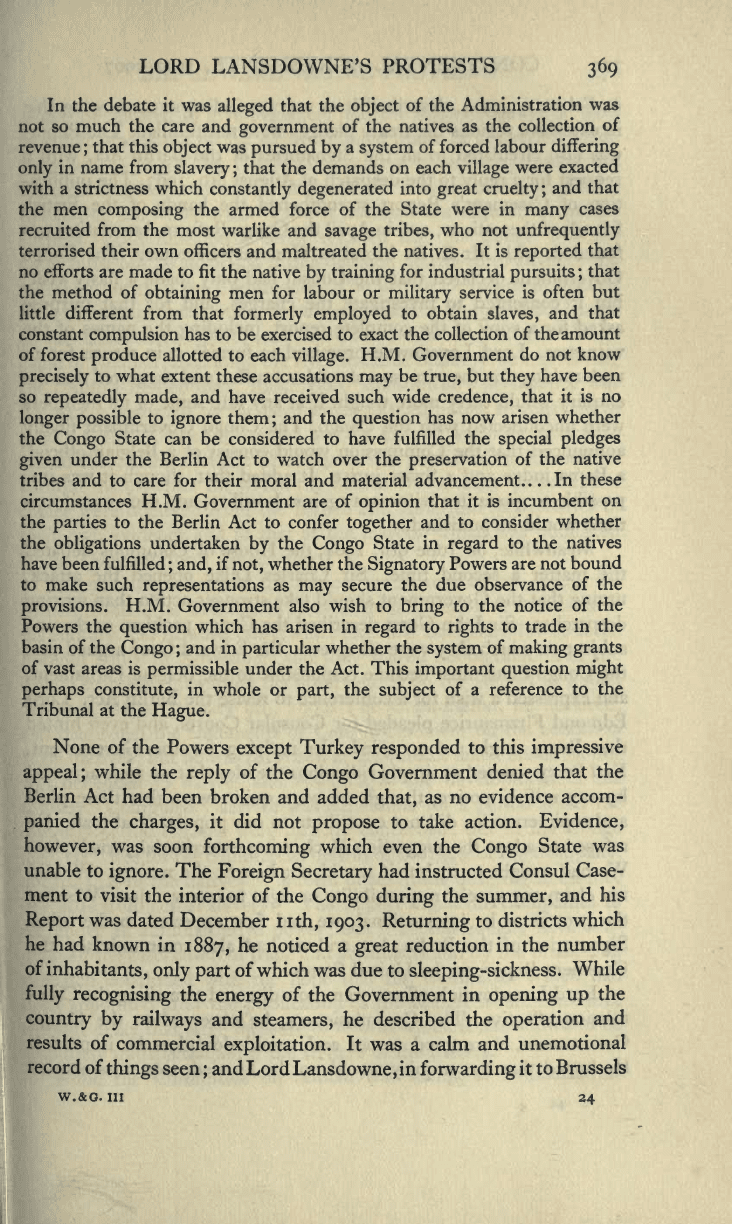
LORD
LANSDOWNE'S
PROTESTS
369
In the debate it
was
alleged
that the
object
of
the
Administration
was
not so much the
care and
government
of the
natives
as the collection
of
revenue
;
that this
object
was
pursued
by
a
system
of forced
labour
differing
only
in name from
slavery
;
that the demands
on
each
village
were exacted
with a
strictness which
constantly degenerated
into
great
cruelty;
and
that
the
men
composing
the armed force of
the State were
in
many
cases
recruited
from
the
most
warlike
and
savage
tribes,
who
not
unfrequently
terrorised
their own
officers
and
maltreated
the natives.
It is
reported
that
no
efforts are made to
fit
the
native
by training
for
industrial
pursuits
;
that
the method
of
obtaining
men
for labour
or
military
service
is often
but
little different from that
formerly employed
to
obtain
slaves,
and that
constant
compulsion
has to
be exercised
to exact
the collection
of the
amount
of forest
produce
allotted
to
each
village.
H.M. Government
do not
know
precisely
to what
extent
these
accusations
may
be
true,
but
they
have
been
so
repeatedly
made,
and
have received
such wide
credence,
that
it is
no
longer possible
to
ignore
them;
and the
question
has now
arisen
whether
the
Congo
State
can be considered to
have fulfilled
the
special
pledges
given
under
the Berlin Act
to
watch over
the
preservation
of the
native
tribes
and
to care for
their moral
and material advancement
In these
circumstances
H.M. Government
are of
opinion
that it is
incumbent
on
the
parties
to
the Berlin Act to confer
together
and
to consider
whether
the
obligations
undertaken
by
the
Congo
State
in
regard
to the
natives
have been
fulfilled
;
and,
if
not,
whether the
Signatory
Powers are
not bound
to make
such
representations
as
may
secure the
due
observance
of the
provisions.
H.M.
Government also wish
to
bring
to the
notice
of
the
Powers the
question
which has
arisen
in
regard
to
rights
to
trade
in
the
basin of
the
Congo
;
and in
particular
whether
the
system
of
making grants
of
vast areas is
permissible
under the Act. This
important
question
might
perhaps
constitute,
in
whole or
part,
the
subject
of
a reference
to
the
Tribunal
at the
Hague.
None
of
the
Powers
except
Turkey
responded
to this
impressive
appeal;
while the
reply
of the
Congo
Government
denied
that
the
Berlin
Act
had
been broken and
added
that,
as
no
evidence
accom-
panied
the
charges,
it
did
not
propose
to take action.
Evidence,
however,
was
soon
forthcoming
which
even the
Congo
State
was
unable
to
ignore.
The
Foreign Secretary
had
instructed
Consul
Case-
ment to
visit the
interior
of
the
Congo
during
the
summer,
and
his
Report
was
dated
December
nth,
1903.
Returning
to districts
which
he had
known
in
1887,
he noticed a
great
reduction
in
the
number
of
inhabitants,
only
part
of
which
was
due to
sleeping-sickness.
While
fully
recognising
the
energy
of
the
Government
in
opening
up
the
country
by
railways
and
steamers,
he described
the
operation
and
results of
commercial
exploitation.
It was
a
calm
and
unemotional
record
of
things
seen
;
and
Lord
Lansdowne,in
forwarding
it to
Brussels
W.&G.
Ill
24
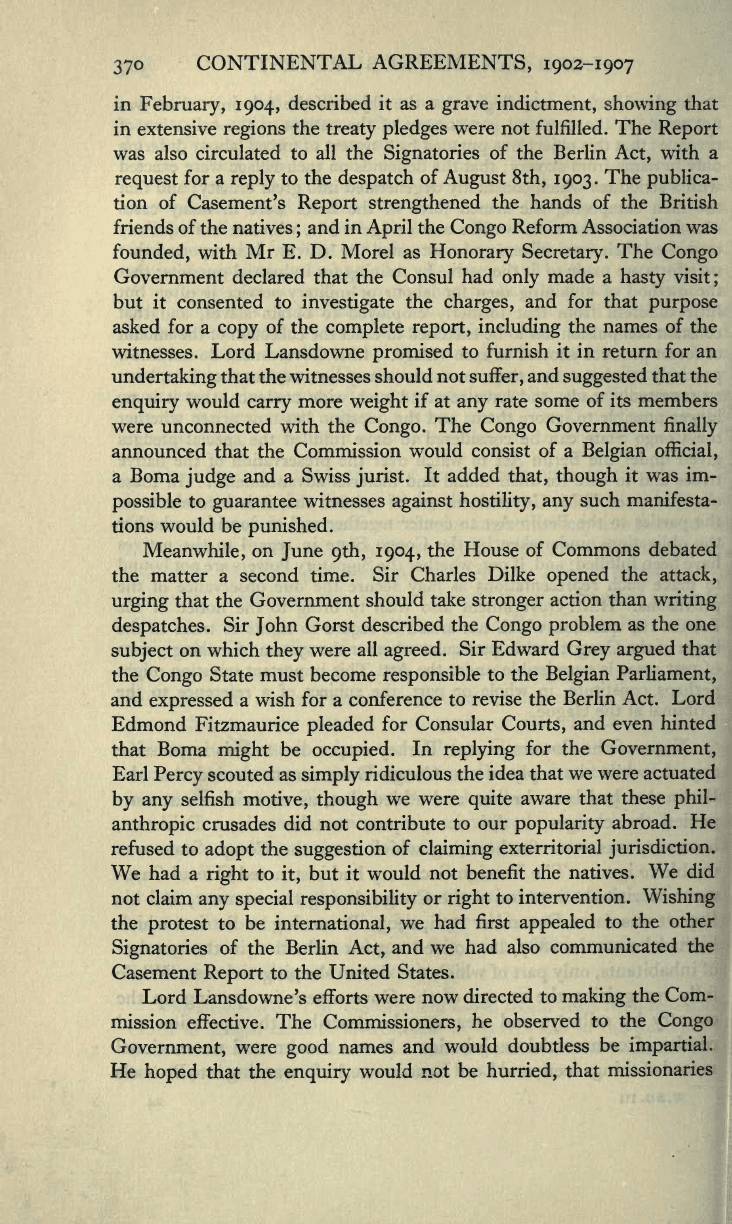
37©
CONTINENTAL
AGREEMENTS,
1902-1907
in
February,
1904,
described it
as a
grave
indictment,
showing
that
in
extensive
regions
the
treaty pledges
were
not fulfilled.
The
Report
was
also
circulated to
all
the
Signatories
of
the Berlin
Act,
with
a
request
for a
reply
to
the
despatch
of
August
8th,
1903.
The
publica-
tion
of
Casement's
Report strengthened
the
hands of the British
friends of
the natives
;
and
in
April
the
Congo
Reform Association
was
founded,
with
Mr E. D. Morel as
Honorary
Secretary.
The
Congo
Government
declared that the
Consul
had
only
made
a
hasty
visit;
but it consented to
investigate
the
charges,
and for
that
purpose
asked for
a
copy
of
the
complete
report, including
the
names of
the
witnesses.
Lord
Lansdowne
promised
to
furnish it
in
return
for an
undertaking
that the witnesses
should not
suffer,
and
suggested
that the
enquiry
would
carry
more
weight
if
at
any
rate
some
of
its
members
were unconnected with the
Congo.
The
Congo
Government
finally
announced
that the
Commission
would consist
of
a
Belgian
official,
a Boma
judge
and a
Swiss
jurist.
It
added
that,
though
it
was
im-
possible
to
guarantee
witnesses
against
hostility,
any
such manifesta-
tions
would be
punished.
Meanwhile,
on
June
9th,
1904,
the
House
of Commons debated
the
matter
a second time.
Sir Charles
Dilke
opened
the
attack,
urging
that
the
Government
should
take
stronger
action than
writing
despatches.
Sir
John
Gorst
described the
Congo
problem
as
the
one
subject
on which
they
were
all
agreed.
Sir Edward
Grey argued
that
the
Congo
State
must become
responsible
to the
Belgian
Parliament,
and
expressed
a wish
for a
conference to
revise the
Berlin
Act.
Lord
Edmond
Fitzmaurice
pleaded
for
Consular
Courts,
and even hinted
that Boma
might
be
occupied.
In
replying
for
the
Government,
Earl
Percy
scouted
as
simply
ridiculous the
idea
that
we
were actuated
by any
selfish
motive,
though
we were
quite
aware that
these
phil-
anthropic
crusades
did
not
contribute
to
our
popularity
abroad.
He
refused
to
adopt
the
suggestion
of
claiming
exterritorial
jurisdiction.
We had
a
right
to
it,
but it
would
not
benefit the
natives.
We did
not
claim
any special
responsibility
or
right
to intervention.
Wishing
the
protest
to
be
international,
we
had
first
appealed
to the
other
Signatories
of
the
Berlin
Act,
and we
had
also
communicated
the
Casement
Report
to the United
States.
Lord Lansdowne
's efforts
were
now directed
to
making
the
Com-
mission
effective.
The
Commissioners,
he observed
to
the
Congo
Government,
were
good
names
and
would
doubtless
be
impartial.
He
hoped
that
the
enquiry
would
not
be
hurried,
that
missionaries
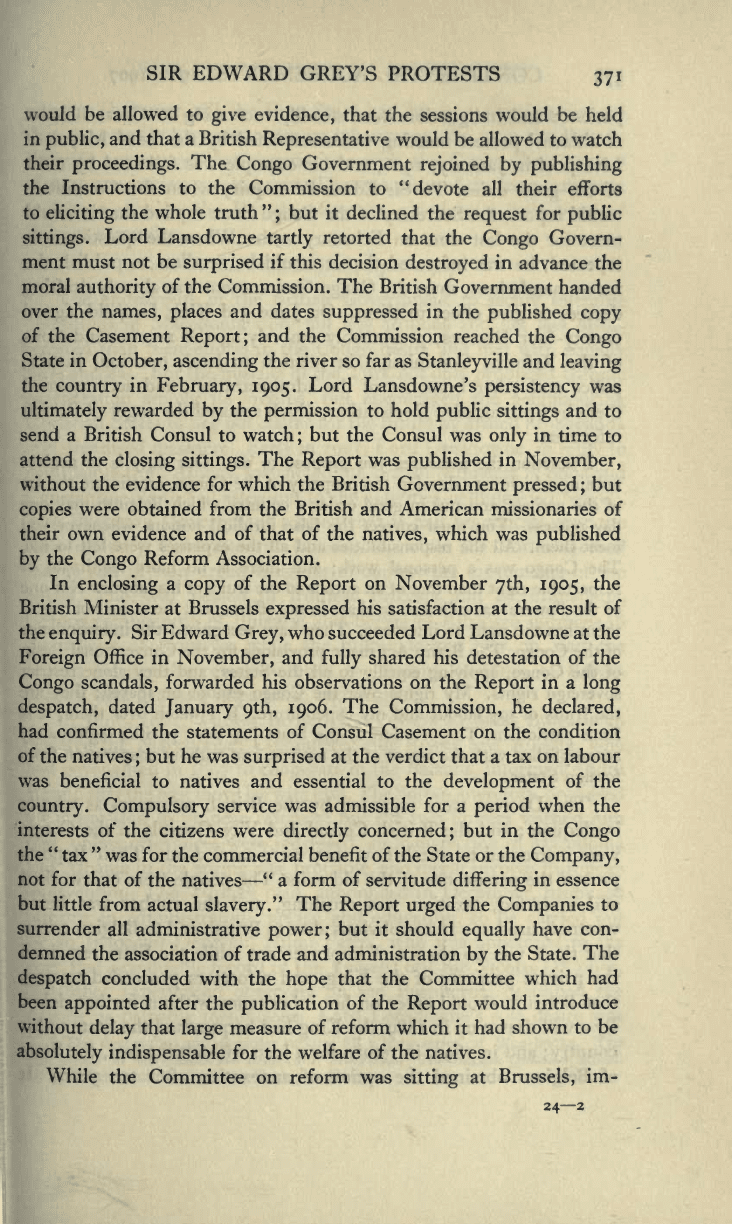
SIR
EDWARD
GREY'S
PROTESTS
371
would
be allowed
to
give
evidence,
that the
sessions
would
be held
in
public,
and that a
British
Representative
would
be allowed to watch
their
proceedings.
The
Congo
Government
rejoined by
publishing
the
Instructions to
the
Commission
to
"devote
all
their
efforts
to
eliciting
the
whole
truth
"
;
but it declined
the
request
for
public
sittings.
Lord
Lansdowne
tartly
retorted
that the
Congo
Govern-
ment must not
be
surprised
if
this
decision
destroyed
in
advance
the
moral
authority
of the
Commission.
The British
Government handed
over
the
names,
places
and
dates
suppressed
in
the
published
copy
of the Casement
Report;
and
the
Commission
reached
the
Congo
State
in
October,
ascending
the river so far as
Stanleyville
and
leaving
the
country
in
February,
1905.
Lord
Lansdowne
's
persistency
was
ultimately
rewarded
by
the
permission
to
hold
public
sittings
and
to
send
a
British Consul
to watch
;
but
the Consul
was
only
in
time to
attend the
closing
sittings.
The
Report
was
published
in
November,
without the evidence
for which
the British
Government
pressed
;
but
copies
were
obtained
from
the
British
and
American missionaries of
their
own
evidence and
of
that
of
the
natives,
which was
published
by
the
Congo
Reform Association.
In
enclosing
a
copy
of
the
Report
on November
7th,
1905,
the
British
Minister at
Brussels
expressed
his
satisfaction at the
result
of
the
enquiry.
Sir Edward
Grey,
who succeeded
Lord
Lansdowne
at the
Foreign
Office
in
November,
and
fully
shared his
detestation
of
the
Congo
scandals,
forwarded his
observations
on
the
Report
in a
long
despatch,
dated
January 9th, 1906.
The
Commission,
he
declared,
had
confirmed
the statements
of
Consul
Casement
on
the condition
of
the
natives
;
but
he was
surprised
at the verdict that
a
tax
on labour
was
beneficial to
natives
and essential to the
development
of
the
country.
Compulsory
service
was
admissible
for a
period
when the
interests
of
the citizens were
directly
concerned
;
but
in
the
Congo
the
"
tax
"
was
for
the commercial benefit
of
the State
or
the
Company,
not for
that
of
the natives
—
"
a form of
servitude
differing
in essence
but
little from
actual
slavery.'
'
The
Report
urged
the
Companies
to
surrender
all
administrative
power;
but it
should
equally
have
con-
demned
the
association
of
trade
and
administration
by
the
State.
The
despatch
concluded
with the
hope
that the Committee
which
had
been
appointed
after
the
publication
of
the
Report
would
introduce
without
delay
that
large
measure
of
reform
which
it
had
shown
to be
absolutely indispensable
for
the
welfare
of
the natives.
While
the
Committee
on reform was
sitting
at
Brussels,
im-
24
—
2
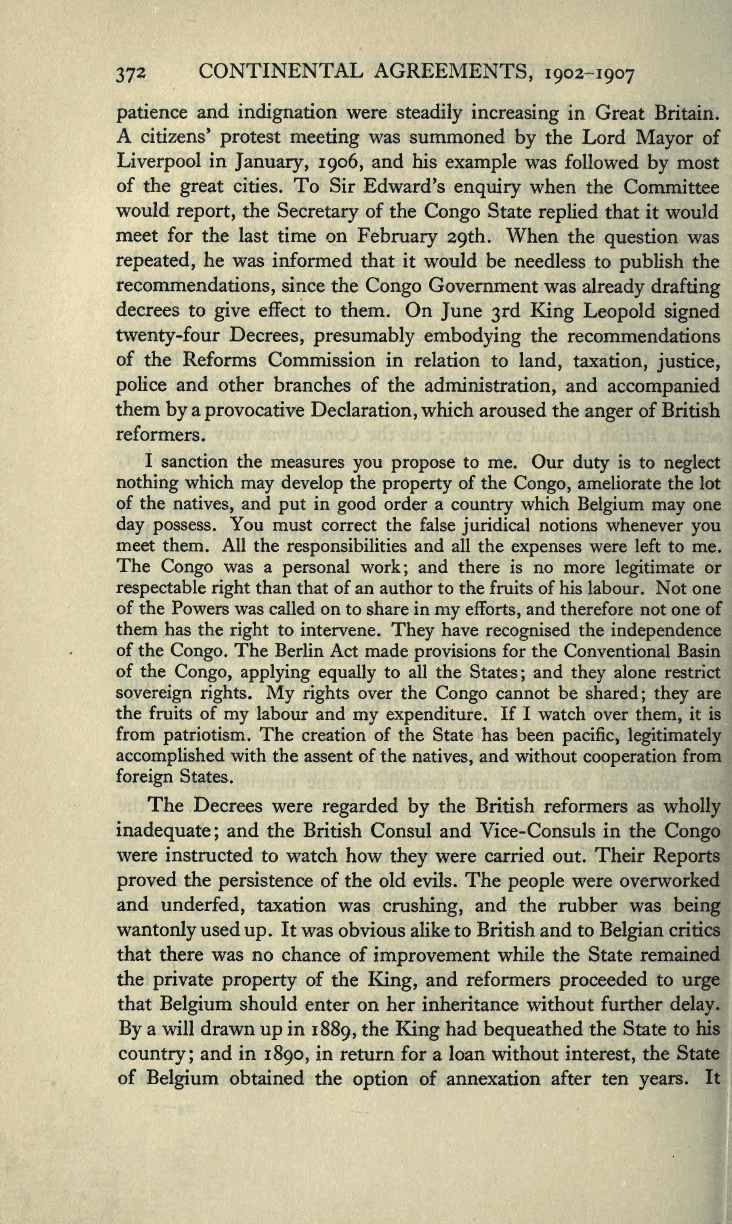
372
CONTINENTAL
AGREEMENTS,
1902-1907
patience
and
indignation
were
steadily
increasing
in
Great Britain.
A citizens'
protest
meeting
was
summoned
by
the
Lord
Mayor
of
Liverpool
in
January, 1906,
and
his
example
was
followed
by
most
of
the
great
cities.
To Sir
Edward's
enquiry
when
the
Committee
would
report,
the
Secretary
of
the
Congo
State
replied
that
it
would
meet for
the
last
time
on
February 29th.
When
the
question
was
repeated,
he
was informed
that it
would be
needless
to
publish
the
recommendations,
since the
Congo
Government was
already drafting
decrees
to
give
effect to them. On
June
3rd
King
Leopold
signed
twenty-four
Decrees,
presumably
embodying
the
recommendations
of
the
Reforms Commission in
relation to
land,
taxation,
justice,
police
and
other branches of
the
administration,
and
accompanied
them
by
a
provocative
Declaration,
which
aroused
the
anger
of
British
reformers.
I
sanction
the
measures
you propose
to
me. Our
duty
is
to
neglect
nothing
which
may
develop
the
property
of the
Congo,
ameliorate the
lot
of
the
natives,
and
put
in
good
order a
country
which
Belgium may
one
day possess.
You must
correct the
false
juridical
notions
whenever
you
meet
them.
All
the
responsibilities
and all
the
expenses
were left to
me.
The
Congo
was a
personal
work;
and
there
is no
more
legitimate
or
respectable
right
than
that
of
an author to
the
fruits of
his
labour.
Not one
of
the
Powers was called on
to share in
my
efforts,
and
therefore
not
one of
them
has the
right
to
intervene.
They
have
recognised
the
independence
of
the
Congo.
The
Berlin Act made
provisions
for
the Conventional Basin
of
the
Congo,
applying
equally
to all the
States;
and
they
alone restrict
sovereign rights.
My
rights
over the
Congo
cannot be
snared;
they
are
the
fruits
of
my
labour
and
my
expenditure.
If I watch
over
them,
it is
from
patriotism.
The
creation
of
the State has been
pacific, legitimately
accomplished
with
the
assent of
the
natives,
and without
cooperation
from
foreign
States.
The
Decrees
were
regarded
by
the British reformers as
wholly
inadequate;
and
the British
Consul and Vice-Consuls
in
the
Congo
were
instructed to
watch how
they
were
carried
out.
Their
Reports
proved
the
persistence
of
the
old
evils.
The
people
were
overworked
and
underfed,
taxation was
crushing,
and the rubber was
being
wantonly
used
up.
It was obvious alike to British
and
to
Belgian
critics
that there was no
chance of
improvement
while the State
remained
the
private
property
of
the
King,
and reformers
proceeded
to
urge
that
Belgium
should
enter on her inheritance without
further
delay.
By
a will
drawn
up
in
1889,
the
King
had
bequeathed
the
State to
his
country;
and
in
1890,
in
return
for a
loan
without
interest,
the
State
of
Belgium
obtained
the
option
of
annexation
after
ten
years.
It
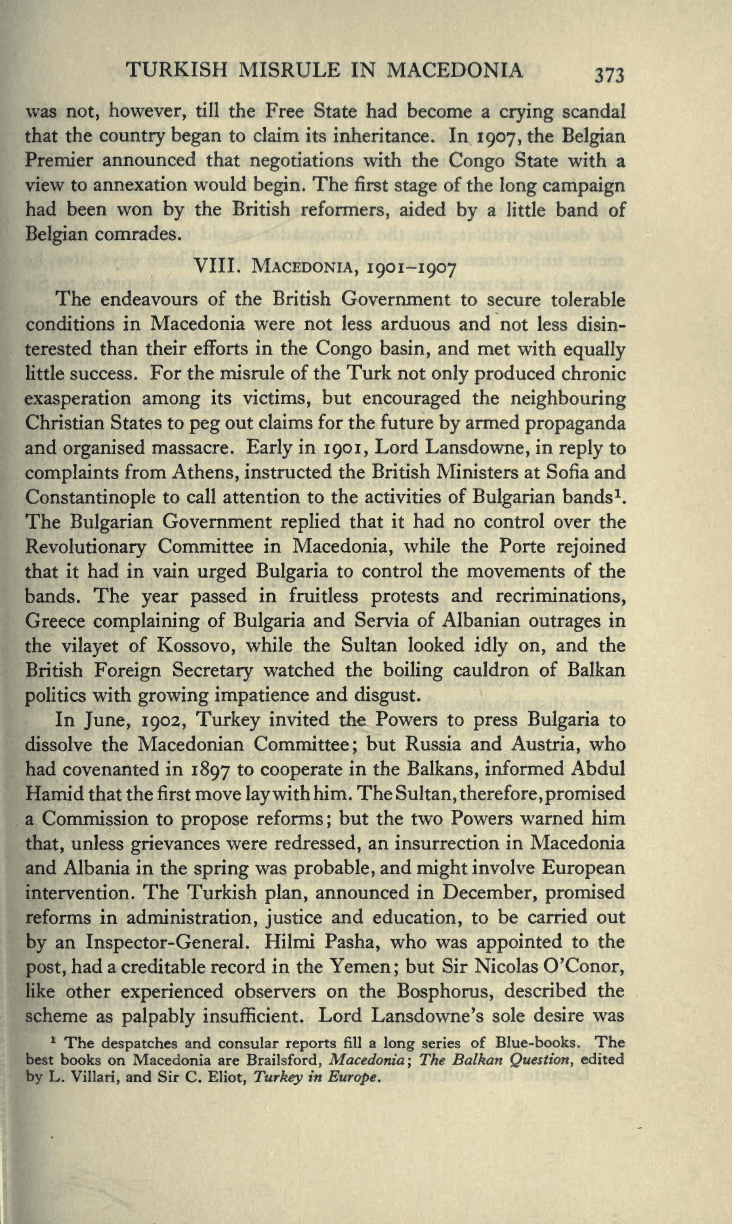
TURKISH
MISRULE IN MACEDONIA
373
was
not,
however,
till the
Free
State
had
become
a
crying
scandal
that
the
country
began
to
claim
its
inheritance.
In
1907,
the
Belgian
Premier
announced
that
negotiations
with the
Congo
State with
a
view
to annexation
would
begin.
The
first
stage
of
the
long campaign
had been
won
by
the
British
reformers,
aided
by
a
little
band of
Belgian
comrades.
VIII.
Macedonia,
1901-1907
The endeavours
of the
British
Government to
secure
tolerable
conditions
in
Macedonia were
not
less
arduous and
not less disin-
terested than
their
efforts
in
the
Congo
basin,
and
met
with
equally
little
success.
For
the
misrule of the Turk
not
only
produced
chronic
exasperation among
its
victims,
but
encouraged
the
neighbouring
Christian States
to
peg
out claims for the
future
by
armed
propaganda
and
organised
massacre.
Early
in
1901,
Lord
Lansdowne,
in
reply
to
complaints
from
Athens,
instructed the
British
Ministers at Sofia and
Constantinople
to
call
attention to the
activities of
Bulgarian
bands
1
.
The
Bulgarian
Government
replied
that it
had no
control over
the
Revolutionary
Committee
in
Macedonia,
while
the Porte
rejoined
that
it
had in vain
urged
Bulgaria
to control the
movements
of
the
bands.
The
year passed
in
fruitless
protests
and
recriminations,
Greece
complaining
of
Bulgaria
and
Servia
of Albanian
outrages
in
the
vilayet
of
Kossovo,
while
the
Sultan
looked
idly
on,
and
the
British
Foreign
Secretary
watched the
boiling
cauldron
of
Balkan
politics
with
growing
impatience
and
disgust.
In
June,
1902,
Turkey
invited
the
Powers
to
press
Bulgaria
to
dissolve
the
Macedonian
Committee;
but
Russia and
Austria,
who
had
covenanted
in
1897
to
cooperate
in
the
Balkans,
informed Abdul
Hamid
that the first
move
lay
withhim.
The
Sultan,
therefore,
promised
a
Commission to
propose
reforms;
but the two
Powers warned
him
that,
unless
grievances
were
redressed,
an
insurrection
in
Macedonia
and
Albania
in
the
spring
was
probable,
and
might
involve
European
intervention. The Turkish
plan,
announced in
December,
promised
reforms in
administration,
justice
and
education,
to
be carried out
by
an
Inspector-General.
Hilmi
Pasha,
who
was
appointed
to the
post,
had a
creditable
record
in
the
Yemen;
but
Sir
Nicolas
O'Conor,
like
other
experienced
observers
on
the
Bosphorus,
described
the
scheme
as
palpably
insufficient.
Lord Lansdowne
's sole
desire was
1
The
despatches
and
consular
reports
fill a
long
series
of Blue-books.
The
best
books on Macedonia are
Brailsford,
Macedonia;
The Balkan
Question,
edited
by
L.
Villari,
and
Sir
C.
Eliot,
Turkey
in
Europe.
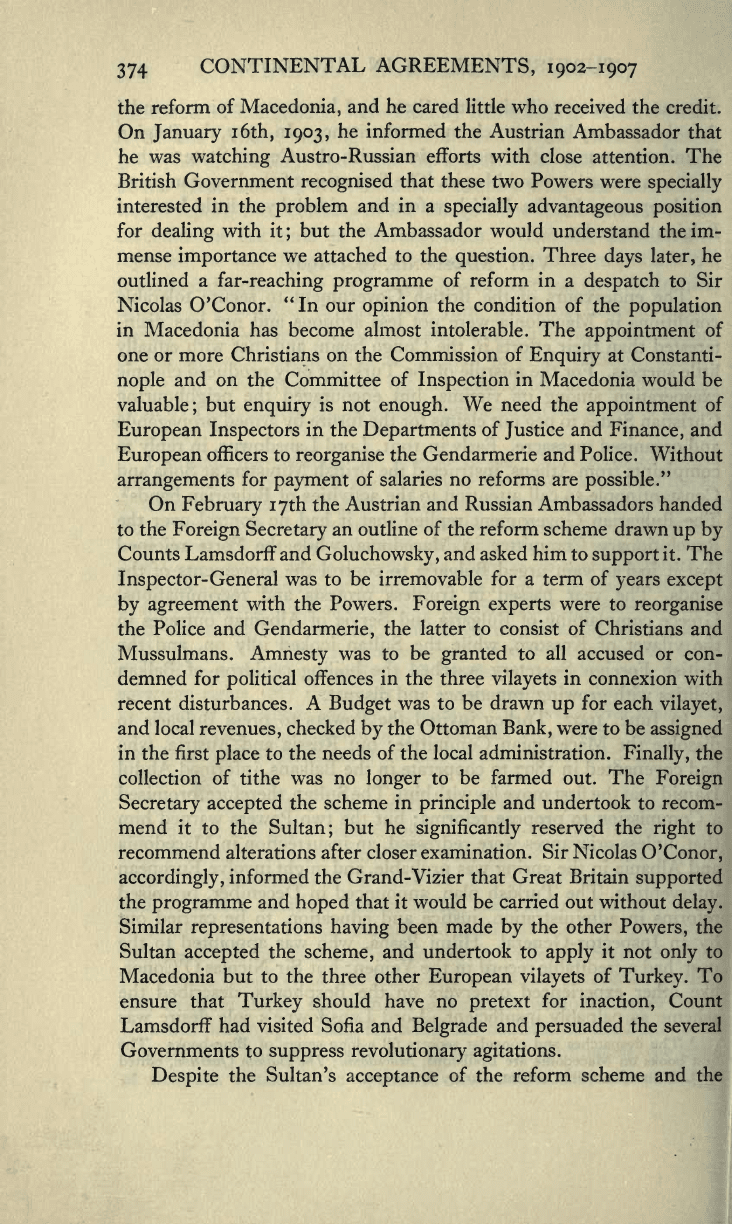
374
CONTINENTAL
AGREEMENTS,
1902-1907
the
reform
of
Macedonia,
and he cared
little
who received the
credit.
On
January
16th,
1903,
he informed
the
Austrian Ambassador
that
he
was
watching
Austro-Russian efforts with
close attention. The
British
Government
recognised
that these
two
Powers were
specially
interested
in
the
problem
and
in
a
specially
advantageous position
for
dealing
with
it;
but the
Ambassador would
understand the
im-
mense
importance
we
attached to the
question.
Three
days
later,
he
outlined
a
far-reaching
programme
of reform in
a
despatch
to
Sir
Nicolas O'Conor.
"
In
our
opinion
the condition of the
population
in
Macedonia has become almost intolerable. The
appointment
of
one
or
more Christians
on
the
Commission of
Enquiry
at Constanti-
nople
and on
the
Committee
of
Inspection
in
Macedonia would be
valuable;
but
enquiry
is
not
enough.
We need
the
appointment
of
European Inspectors
in
the
Departments
of
Justice
and
Finance,
and
European
officers
to
reorganise
the
Gendarmerie
and
Police.
Without
arrangements
for
payment
of salaries no
reforms
are
possible."
On
February
17th
the Austrian
and Russian Ambassadors
handed
to
the
Foreign Secretary
an outline of the reform scheme drawn
up
by
Counts Lamsdorff and
Goluchowsky,
and asked him
to
support
it.
The
Inspector-
General
was
to
be irremovable for
a
term
of
years except
by
agreement
with
the
Powers.
Foreign
experts
were to
reorganise
the
Police and
Gendarmerie,
the latter
to consist of
Christians and
Mussulmans.
Amnesty
was to
be
granted
to
all
accused or con-
demned
for
political
offences
in
the three
vilayets
in
connexion
with
recent disturbances.
A
Budget
was
to
be drawn
up
for
each
vilayet,
and local
revenues,
checked
by
the
Ottoman
Bank,
were to be
assigned
in
the first
place
to
the
needs of
the
local
administration.
Finally,
the
collection
of
tithe
was
no
longer
to
be farmed
out.
The
Foreign
Secretary
accepted
the
scheme
in
principle
and undertook
to
recom-
mend
it to the
Sultan;
but
he
significantly
reserved
the
right
to
recommend alterations after closer
examination.
Sir
Nicolas
O'Conor,
accordingly,
informed
the
Grand-Vizier
that
Great Britain
supported
the
programme
and
hoped
that it
would
be
carried out
without
delay.
Similar
representations
having
been
made
by
the other
Powers,
the
Sultan
accepted
the
scheme,
and undertook to
apply
it
not
only
to
Macedonia
but to the
three other
European
vilayets
of
Turkey.
To
ensure that
Turkey
should have
no
pretext
for
inaction,
Count
Lamsdorff
had
visited Sofia and
Belgrade
and
persuaded
the several
Governments to
suppress
revolutionary
agitations.
Despite
the
Sultan's
acceptance
of
the reform
scheme and the
